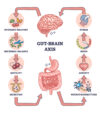Body Inflammation = Brain Inflammation
At our clinic, we talk often about joint pain, gut issues, and systemic inflammation. But what if we told you that your body’s inflammation is silently impacting your brain? That knee inflammation, or gut permeability, is more than discomfort—it’s part of a chain reaction that can lead to brain inflammation and even neurological risk over time.
Here’s how that works, why it matters, and how you can proactively address it.
Most people think inflammation is something that happens in one spot:
👉 “My knee hurts.”
👉 “My gut is irritated.”
👉 “My joints are stiff.”
But that’s not how the human body works.
There Is No Such Thing as “Isolated” Inflammation
When your body is inflamed… your brain is inflamed too.
Modern neuroscience, immunology, and functional medicine research all confirm this:
inflammation anywhere in the body creates inflammatory signaling everywhere — especially in the brain.
This systemic inflammation can pass through or weaken the blood-brain barrier and activate the brain’s immune cells (microglia), leading to what’s called neuroinflammation.
“Just Knee Pain”? Think Again.
Inflammation in one joint raises circulating inflammatory cytokines that influence your entire brain-body system. These inflammatory molecules can contribute to:
- Brain fog
- Dizziness
- Vertigo
- Fatigue
- Memory issues
- Mood changes
- Light/sound sensitivity
- Poor focus
- Heightened stress responses
- Migraines
- Vestibular dysfunction
- And long-term neurodegenerative vulnerability
Research now links systemic inflammation with higher risk for:
🧠 Alzheimer’s disease (AD)
🧠 Parkinson’s disease (PD)
🧠 Dementia
🧠 Cognitive decline
🧠 Meniere’s + balance disorders
Inflammation in your joints affects your brain.
Inflammation in your gut affects your brain.
Inflammation in your immune system affects your brain.
It’s all one connected system.
Your gut is the #1 gateway to your brain
Research now shows leaky gut = leaky brain.
When the gut barrier becomes compromised, inflammatory chemicals and bacterial toxins enter circulation. This raises:
- Homocysteine
- High-sensitivity CRP
- Autoimmune activation
- Oxidative stress
- Immune overdrive
- And many others
These Markers Are only the bare minimun
While markers like Vitamin D, homocysteine, hs-CRP, and oxidative stress levels are powerful indicators of inflammation and neurological vulnerability, they’re truly just the tip of the iceberg.
In functional medicine and clinical neuroscience, we look far deeper.
Why? Because your brain and body operate on an incredibly complex biochemical network — hormones, neurotransmitters, immune messengers, gut-derived signals, micronutrients, toxins, stress chemistry, and even your circadian rhythm all influence your neurological health.
So yes — we test the major, familiar markers.
But behind the scenes, we evaluate dozens of other systems that most people (and many doctors) never consider.
Here are just a few additional categories we assess:
And that’s still not the full list.
- Methylation pathways (beyond just homocysteine)
- Advanced inflammatory cytokines
- Blood–brain barrier integrity indicators
- Comprehensive micronutrient panels
- Neurotransmitter precursors + metabolism patterns
- Hormone balance that influences brain function (thyroid, cortisol curve, sex hormones)
- Environmental toxicity load (mold markers, heavy metals, pollutants)
- Mitochondrial function + cellular energy markers
- Advanced gut ecology (microbiome balance, LPS activity, gut barrier proteins)
- Immune system regulation (TH1/TH2 balance, autoimmunity patterns)
The goal is simple:
We identify what’s driving your inflammation, your symptoms, and your neurological risk — and then create a precise, personalized plan to correct it.
Most patients are shocked when they learn how many hidden factors can influence dizziness, fatigue, mood, memory, sleep quality, pain, or long-term brain health. What seems “normal” or minor on the surface is often rooted in deep biochemical patterns that we can measure and correct.
This is what makes a functional neurology approach different:
✨ we don’t guess — we test, measure, interpret, and optimize.
These same markers strongly correlate with increased risk for neurological challenges like:
🧠 Cognitive decline
🧠 Memory loss
🧠 Early neurodegeneration (PD, AD, dementia)
🧠 Chronic dizziness + vertigo
🧠 Meniere’s and vestibular dysfunction
Your gut literally communicates with your brain through the vagus nerve, immune pathways, and inflammatory signaling. When the gut becomes inflamed, the brain always feels it.
So what can you do?
Here’s the empowering part
You are NOT at the mercy of inflammation.
We use advanced testing to identify the exact drivers of systemic + neurological inflammation so we can reduce your risk and restore brain-body balance:
When we lower inflammation in the body, we protect the brain.
The bottom line:
- Your brain health depends on your body’s health.
- Your joints, gut, and immune system are all part of the same conversation.
- Inflammation anywhere is inflammation everywhere.
And the earlier you identify it, the more you can protect your long-term neurological vitality.
References
- Kearns R., et al. Gut–Brain Axis and Neuroinflammation. PMC. 2024. PMC
- Loh J.S., et al. Microbiota–Gut–Brain Axis and its Therapeutic Applications. Nat Rev on 2024. Nature
- Mou Y., et al. Gut Microbiota Interact With the Brain Through Systemic Immune Activation. Front Immunol. 2022. Frontiers
- “Inflammation & Brain Health.” Harvard Medicine Magazine. Harvard Medicine Magazine
- Review article: Inflammation From Peripheral Organs to the Brain. Front Aging Neurosci. 2022. Frontiers
- Zhu S., et al. The Progress of Gut Microbiome Research Related to Brain Disorders. J Neuroinflammation. 2020. jneuroinflammation.biomedcentral.com


